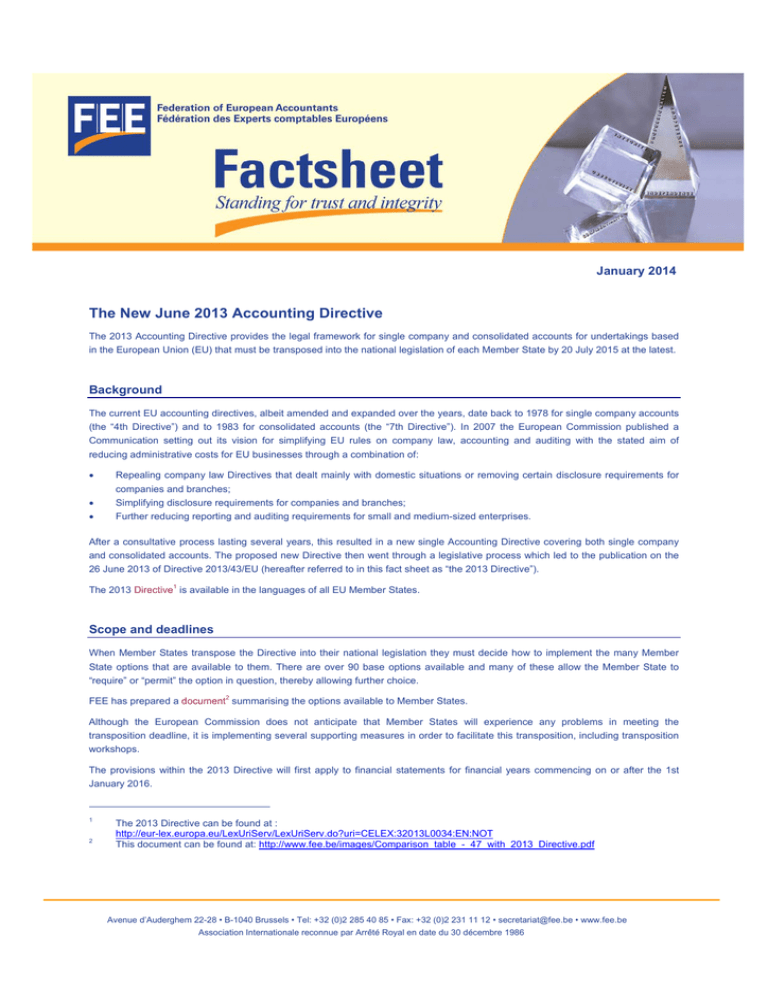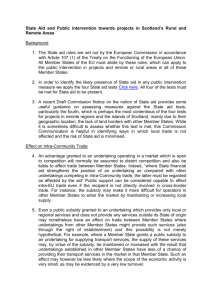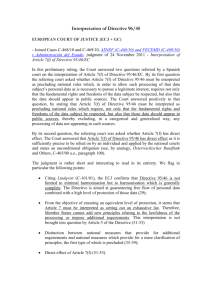The New June 2013 Accounting Directive January 2014
advertisement

January 2014 The New June 2013 Accounting Directive The 2013 Accounting Directive provides the legal framework for single company and consolidated accounts for undertakings based in the European Union (EU) that must be transposed into the national legislation of each Member State by 20 July 2015 at the latest. Background The current EU accounting directives, albeit amended and expanded over the years, date back to 1978 for single company accounts (the “4th Directive”) and to 1983 for consolidated accounts (the “7th Directive”). In 2007 the European Commission published a Communication setting out its vision for simplifying EU rules on company law, accounting and auditing with the stated aim of reducing administrative costs for EU businesses through a combination of: Repealing company law Directives that dealt mainly with domestic situations or removing certain disclosure requirements for companies and branches; Simplifying disclosure requirements for companies and branches; Further reducing reporting and auditing requirements for small and medium-sized enterprises. After a consultative process lasting several years, this resulted in a new single Accounting Directive covering both single company and consolidated accounts. The proposed new Directive then went through a legislative process which led to the publication on the 26 June 2013 of Directive 2013/43/EU (hereafter referred to in this fact sheet as “the 2013 Directive”). 1 The 2013 Directive is available in the languages of all EU Member States. Scope and deadlines When Member States transpose the Directive into their national legislation they must decide how to implement the many Member State options that are available to them. There are over 90 base options available and many of these allow the Member State to “require” or “permit” the option in question, thereby allowing further choice. 2 FEE has prepared a document summarising the options available to Member States. Although the European Commission does not anticipate that Member States will experience any problems in meeting the transposition deadline, it is implementing several supporting measures in order to facilitate this transposition, including transposition workshops. The provisions within the 2013 Directive will first apply to financial statements for financial years commencing on or after the 1st January 2016. 1 2 The 2013 Directive can be found at : http://eur-lex.europa.eu/LexUriServ/LexUriServ.do?uri=CELEX:32013L0034:EN:NOT This document can be found at: http://www.fee.be/images/Comparison_table_-_47_with_2013_Directive.pdf Avenue d’Auderghem 22-28 • B-1040 Brussels • Tel: +32 (0)2 285 40 85 • Fax: +32 (0)2 231 11 12 • secretariat@fee.be • www.fee.be Association Internationale reconnue par Arrêté Royal en date du 30 décembre 1986 Page 2 of 8 The undertakings affected by the 2013 Directive include public and private limited liability companies and also unlimited companies and partnerships (limited or otherwise) where all the members have limited liability. Not for profit organisations are excluded. The 2013 Directive provides, for the first time, a full list of all legal forms of undertakings covered by the Directive detailed by each EU Member State. Summary of the main changes The 2013 Directive is a re-cast of the 4th and 7th Directives rather than a complete conceptual rewrite. Consequently, many of the provisions and, indeed, text in the 2013 Directives has been carried over from the 4th and 7th Directive; The 2013 follows a more structured approach to the layout of the Articles, not least arising from the amalgamation of two Directives into one and a small reduction in the number of options available to Member States; It is based on a “bottom-up” approach in that it starts with the requirements for small undertakings first and then adds additional accounting and reporting requirements as undertakings pass the thresholds for medium and large undertakings; It contains new size thresholds for small, medium and large undertakings that not only impacts on their accounting and reporting requirements but also on the requirement to prepare consolidated financial statements and to have an audit. It also contains the new category of micro-undertaking (technically, this was included in the 4th Directive but only via an amendment thereto made in March 2012); It formalises eight fundamental accounting principles (with some Member State options); It contains the new requirement for country by country reporting (outside of the financial statements) detailing all payments exceeding € 100 000 per financial year made to governments by large undertakings and public interest entities operating in the forestry and extractive industries. Detailed considerations New size criteria and thresholds The following are mandatory thresholds for determining the category into which an undertaking (or group of undertakings) falls: Turnover Balance sheet total Old New Old New Million € Million € Million € Million € Micro undertakings n\a ≤ 0.7 n\a Small undertakings ≤ 8.8 ≤ 8 Medium-sized undertakings ≤ 35 Large Undertakings > 35 Average number of employees Old New ≤ 0.35 n\a ≤ 0.10 ≤ 4.4 ≤ 4 ≤ 50 ≤ 50 ≤ 40 ≤ 17.5 ≤ 20 ≤ 250 ≤ 250 > 40 > 17.5 > 20 > 250 > 250 The undertaking must be within any two of the three thresholds for two successive accounting periods; The default thresholds for small undertakings’ turnover and balance sheet total are €8 million and €4 million, respectively. However, Member States have the option to increase either or both of these thresholds for small undertakings up to a maximum €12 million and €6 million, respectively; These new thresholds are used for both determining which accounting regime the company is subject to, whether it needs to prepare consolidated financial statements and also whether it requires an audit. Avenue d’Auderghem 22-28 • B-1040 Brussels • Tel: +32 (0)2 285 40 85 • Fax: +32 (0)2 231 11 12 • secretariat@fee.be • www.fee.be Association Internationale reconnue par Arrêté Royal en date du 30 décembre 1986 Page 3 of 8 Fundamental accounting principles Items presented in the financial statements must be recognised and measured in accordance with the following general principles: The undertaking is presumed to be carrying on its business as a going concern (this is to be disclosed in the accounting policies); Accounting policies and measurement bases shall be applied consistently between accounting periods; Recognition and measurement shall be on a prudent basis, and in particular: o o Only profits made at the balance sheet date to be recognised, All liabilities arising in the course of a financial year to be recognised even if these only became apparent between the end of the financial year and the date on which the balance sheet is drawn up; All negative value adjustments to be recognised whether the results for the financial year is a profit or a loss. Amounts recognised in the balance sheet and profit and loss account shall be computed on the accruals basis; Opening balance sheet for each financial year shall correspond to preceding closing balance sheet; The components of assets and liabilities shall be valued separately; Any set-off between assets and liabilities, or between income and expenditure items, shall be prohibited; All items to be accounted for and presented having regard to the substance of the transaction or arrangement concerned; Items shall be measured in accordance with the principle of purchase price or production cost; and Materiality applies to recognition, measurement, presentation, disclosure and consolidation. o However, there are Member State options in respect to certain of these principles: Set-off: may be permitted on the face of the financial statements but the gross amounts must then be disclosed in the notes; Substance over form: may be disapplied; Materiality: may be restricted to presentation and disclosure only; Prudence: may permit or require the recognition of all foreseeable liabilities and potential losses in respect of a financial year, if these only became apparent between the end of the financial year and the date on which the balance sheet is drawn up. Measurement at fair value References to valuation methods designed to take into account the effects of inflation and using the replacement value method (for stock and fixed assets) contained in the 4th Directive have been removed in the 2013 Directive. However, under the 2013 Directive Member States have the option to: a) Permit or require undertakings to revalue fixed assets; b) c) Permit or require undertakings to value financial instruments at fair value; Permit or require undertakings to measure specified categories of assets other than financial instruments at fair value. For b) & c) above, Member states have the option to restrict the permission or requirement to consolidated financial statements only or to certain classes of undertakings (“classes” of undertakings not being defined in the Directive). Composition of the financial statements Financial Statements must comprise of a balance sheet, profit and loss account and selected notes to the financial statements. Member States have the option to require medium sized and large undertakings to include other statements, such as a cash flow statement or statement of other comprehensive income. Avenue d’Auderghem 22-28 • B-1040 Brussels • Tel: +32 (0)2 285 40 85 • Fax: +32 (0)2 231 11 12 • secretariat@fee.be • www.fee.be Association Internationale reconnue par Arrêté Royal en date du 30 décembre 1986 Page 4 of 8 Balance sheet items Some of the more important changes and Member State options in respect of balance sheet items are listed below: There have been changes to the treatment of goodwill which is to be amortised over a minimum of 5 years to a maximum of its useful economic life. If the useful economic life cannot be determined then it must be written-off over a period selected of between 5 and 10 years by the Member States; The treatment of other intangible assets now generally follows that of goodwill; There is a Member State option to permit or require the related costs of borrowing to be added to the cost of fixed and current assets; Subscribed unpaid share capital must be treated as an asset, either shown separately or under the heading of Debtors. Profit and loss account Some of the more important changes and Member State options in respect of profit and loss account items are listed below: The permitted layouts for the profit and loss account have been reduced from four options to two. The options permitting the presentation of “Charges” before “Income” have been deleted; Undertakings are permitted to provide more detail than required on the face of the profit and loss account and Member States have the options to require additional information or for headings to be combined. Member States are also permitted to restrict deviations from the standard formats as far as necessary to facilitate electronic filing; There is no heading for extraordinary items in the standard formats (but undertakings can add additional lines and Member States can permit or require additional lines). The 2013 Directive requires disclosure of exceptional items in the notes for medium-sized and large undertakings. Micro-undertakings Member States have no option in defining the size criteria for micro-undertakings but have the option whether or not to grant any or all of the following accounting simplifications: To prepare an abridged balance sheet; To prepare an abridged profit & loss account*; No obligation to prepare notes to the financial statements nor a management report; To use of “Cash +” accounting - the accruals basis is used only for revenue, raw materials\consumables, staff costs, value adjustments to assets and taxation; Not permitted to use fair value accounting; Required to publish only an abridged balance sheet. Investment and financial holding undertakings are excluded from these simplifications. In other respects, micro-undertakings are treated as small undertakings. Micro-undertakings must still maintain accounting records in accordance with national requirements. Small undertakings Member States have the option to apply some, all or none of the following simplifications: To prepare an abridged balance sheet*; To prepare an abridged profit and loss account (starting with ‘Gross profit or loss’); See example: http://www.fee.be/images/Factsheet_New_Accounting_Directive_1401_Appendix.pdf Avenue d’Auderghem 22-28 • B-1040 Brussels • Tel: +32 (0)2 285 40 85 • Fax: +32 (0)2 231 11 12 • secretariat@fee.be • www.fee.be Association Internationale reconnue par Arrêté Royal en date du 30 décembre 1986 Page 5 of 8 To prepare notes to the financial statements that only cover: o o o o o o o Accounting policies; Revaluations and value adjustments to assets at fair value; Financial commitments; Exceptional items; Amounts owed falling due after more than 5 years; Average number of employees; Credit transactions and commitments relating to members of the managerial body; To exempt the preparation of a management report or to permit the preparation of an abridged management report (excluding non-financial key performance indicators); To exempt the publication of a profit & loss account and management report. Medium-sized undertakings Medium-sized undertakings must fulfil all the requirements relating to small undertakings and then also disclose present and disclose additional information. In respect of the additional information, Member States have the option to apply some, all or none of the following simplifications: To prepare an abridged profit & loss account (starting with ‘Gross profit or loss’); To prepare an abridged management report (excluding non-financial key performance indicators); To publish abridged balance sheet; and To publish abridged notes to the financial statements. These include all the notes required for small entities plus: o Movements in fixed assets; o o o o o o o o o o o o Adjustments to assets arising from tax legislation; Directors’ emoluments etc.; Analysis of staffing costs; Details of interests in associates, subsidiaries etc.; Deferred tax provisions and movements; Shares subscribed for (including by class and warrants, if appropriate); Any undertaking of which it is a member with unlimited liability; Ultimate controlling party and location where consolidated accounts are available; Proposed appropriation of profit or loss; Off-balance sheet arrangements; Unadjusted post-balance sheet events; Transactions with related parties (Member State option to restrict these only to transactions not concluded under normal market conditions). There is a Member State option to require medium-sized undertakings to provide disclosures in the financial statement in addition to those specified in the 2013 Directive. Large undertakings and public interest entities Public interest entities (PIEs) are those with traded securities, credit institutions, insurance institutions and any others designated as such by a Member State. This is understood to be consistent with the definition of PIEs in the new Statutory Audit Directive following the provisional agreement in trilogue on the reform of the audit sector of 17 December 2013. There are no simplification options available. In addition to the cumulative reporting requirements for medium-sized undertakings, large undertakings and PIEs are also obliged to publish the following notes to the financial statements: Analysis of turnover by geographical markets and type of activity; Details of payments made to auditors. Avenue d’Auderghem 22-28 • B-1040 Brussels • Tel: +32 (0)2 285 40 85 • Fax: +32 (0)2 231 11 12 • secretariat@fee.be • www.fee.be Association Internationale reconnue par Arrêté Royal en date du 30 décembre 1986 Page 6 of 8 There is a Member State option to require PIEs and large undertakings to provide disclosures in the financial statement in addition to those specified in the 2013 Directive. Consolidated financial statements Fundamentally, the requirements in the 2013 Directive are unchanged from those in the 7th Directive. Small groups must be exempted from preparing consolidated financial statements and Member States may exempt medium-sized groups (unless, in both cases, the group contains a public interest entity). Management reports The name has been changed from that of “annual report” in the 4th Directive but the requirements are almost identical. The only significant change is that a description of important events that have occurred since the end of the year has been removed – although this is now subject to a note to the financial statements for medium-sized and large undertakings. Contents of the management report The management report shall include: 1. A fair review of the development and performance of the undertaking's business and of its position, together with a description of the principal risks and uncertainties that it faces. The review shall be a balanced and comprehensive analysis and shall include both relevant financial and non- financial key performance indicators. 2. The management report shall also give an indication of: a. the undertaking's likely future development; b. activities in the field of research and development; c. information concerning acquisitions of own shares; d. the existence of branches of the undertaking; and e. in relation to the undertaking's use of financial instruments and where material: i. the undertaking's financial risk management objectives and policies, including its policy for hedging each major type of forecasted transaction; and ii. the undertaking's exposure to price risk, credit risk, liquidity risk and cash flow risk. Additionally, the undertaking’s auditor shall express an opinion on whether: The management report is consistent with the financial statements; The management report is prepared in accordance with the applicable legal requirements; Based on the auditor’s knowledge and understanding, there are any material misstatements in the management report. Payments to governments This is a completely new requirement that affects large undertakings and public interest entities active in the extractive or forestry industries. It requires the disclosure of any payment (or series of payments) to governments totalling € 100 000 or more in a financial year. The payments will include taxation, royalties and, in certain circumstances, dividends. An annual disclosure is required in a public report that is outside the annual financial statements. Reporting must be made on a country-by-country and project-by-project basis. There is no requirement for the involvement of the undertaking’s auditor. Auditing requirements The financial statements of all public interest entities, medium-sized and large companies must be audited. The 2013 Directive does not require the audit of a small undertaking but permits Member States to require an audit after taking into consideration the specific conditions and needs of small undertakings and users of their financial statements. Avenue d’Auderghem 22-28 • B-1040 Brussels • Tel: +32 (0)2 285 40 85 • Fax: +32 (0)2 231 11 12 • secretariat@fee.be • www.fee.be Association Internationale reconnue par Arrêté Royal en date du 30 décembre 1986 Page 7 of 8 Interaction with International Financial Reporting Standards (IFRS) The 2013 Directive encompasses all companies governed by Member State law whereas the 2002 IAS Regulation only made adoption of IFRSs mandatory for the consolidated financial statements of companies listed in European securities markets. There is a precedence that must be observed for undertakings using full IFRSs: If the IFRSs are silent on a matter the Directive should be referred to for its treatment; If there is a conflict between IFRSs and the Directive, the treatment prescribed in the IFRS takes precedence. Interaction with the International Financial Reporting Standards for Small and Medium Sized Entities (IFRS for SMEs) The 2013 Directive does not include any specific references to the IFRS for SMEs – the Commission’s previously stated position was that IFRS for SMEs would not serve the objectives of simplification and the reduction of administrative burden for SMEs as defined by the EU. There is no specific prohibition for Member States permitting or demanding that IFRS for SMEs be used by their small or medium sized undertakings but the 2013 Directive still has two (potential) areas of incompatibility with the IFRS for SME. One of the areas of incompatibility is the treatment of amortisation periods for goodwill where the expected useful life cannot be estimated – the IFRS for SMEs demands a 10 year amortisation period and under the 2013 Directive a Member State has the option to choose an amortisation period in such circumstances of between 5 and 10 years. Thus, depending on the Member State’s decision, this incompatibility may or may not be an issue. The other incompatibility relates to the treatment of unpaid subscribed share capital, which the 2013 Directive requires be carried as an asset but which the IFRS for SMEs requires to be offset against equity. Obviously, this is only an issue for undertakings finding themselves in this situation. The IASB has not removed this incompatibility in their latest exposure draft of the standard published in October 2013. The next step All 28 EU Member States must transpose the 2013 Directive into national legislation. The Directive contains a considerable number of options that the Member States must consider. FEE member bodies, the accountancy profession and other relevant stakeholders are encouraged to offer assistance to their national governments in advising as to the application of these options in order to achieve the best accounting treatment and the greatest comparability across Member States. About FEE FEE (Fédération des Experts-comptables Européens – Federation of European Accountants) is an international non-profit organisation based in Brussels that represents 48 institutes of professional accountants and auditors from 36 European countries, including all of the 28 EU member states. FEE has a combined membership of more than 800.000 professional accountants, working in different capacities in public practice, small and large accountancy firms, businesses of all sizes, government and education – all of whom contribute to a more efficient, transparent and sustainable European economy. Avenue d’Auderghem 22-28 • B-1040 Brussels • Tel: +32 (0)2 285 40 85 • Fax: +32 (0)2 231 11 12 • secretariat@fee.be • www.fee.be Association Internationale reconnue par Arrêté Royal en date du 30 décembre 1986



